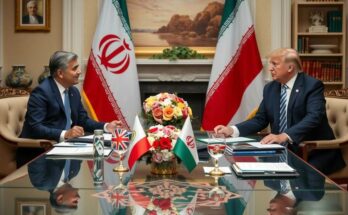The United Arab Emirates has assured U.S. lawmakers that it will not supply arms to Sudan’s paramilitary forces, leading to a reconsideration of a $1.2 billion arms sale to the UAE. Lawmakers emphasize the need for ongoing monitoring of the UAE’s commitments as they seek to reduce violence in Sudan’s civil war.
In a recent development, the United Arab Emirates (UAE) has assured the United States that it has ceased supplying weaponry to the paramilitary forces engaged in Sudan’s ongoing civil conflict. In conversations with U.S. lawmakers, the UAE pledged to curtail arms transfers to the Rapid Support Forces (RSF) in an effort to alleviate concerns regarding its involvement in Sudan’s violent struggle. This promise has influenced lawmakers to reconsider their opposition to a significant arms sale worth $1.2 billion to the UAE, which primarily consists of advanced military equipment.
Senator Chris Van Hollen disclosed details of the UAE’s assurances through a correspondence he received from the White House. The letter, signed by Middle East policy coordinator Brett McGurk, emphasized that the UAE is no longer transferring any arms to the RSF. Van Hollen expressed that he had been leveraging arms sales discussions to pressure for a reduction in violence in Sudan and stated he would reevaluate this stance if the UAE fails to uphold its commitments.
Representative Sara Jacobs echoed these sentiments, promising diligent monitoring of the UAE’s adherence to the agreement. She noted that the RSF’s capabilities would be diminished without support from the UAE, thus increasing the likelihood of pursuing peace negotiations. Although the UAE maintains that it has not provided assistance to the RSF, previous reports from United Nations experts indicated credible accusations of arms transfers, particularly via Chad.
The lawmakers’ efforts were directed at obstructing a substantial arms package that included long-range missiles, amidst a context in which former President Trump had previously shown a readiness to engage in extensive arms sales to the UAE. Following President Biden’s election, there has been a shift toward increased scrutiny concerning military sales, particularly in light of the ongoing conflict in Sudan.
The situation in Sudan, marked by a brutal civil war, has led to severe humanitarian crises, displacing millions and resulting in substantial loss of life. The Rapid Support Forces (RSF), a paramilitary group, has been a key player in the conflict, with allegations of receiving foreign support to bolster its military capabilities. The United Arab Emirates has been scrutinized for its alleged involvement in supplying arms to the RSF, prompting concern among U.S. lawmakers. In response, the UAE has made assurances to the U.S. that it has ceased such actions, aiming to alleviate these concerns while engaging in a major arms deal with the U.S.
The UAE’s commitment to halt arms supplies to Sudan’s paramilitaries has led U.S. lawmakers to reassess proposed restrictions on arms sales to the Gulf nation. Although assurances have been made, the situation remains delicate, and active monitoring by lawmakers will continue to ensure compliance, critical to easing hostilities in Sudan and potentially facilitating peace negotiations.
Original Source: www.france24.com




